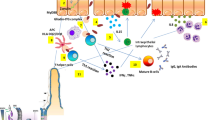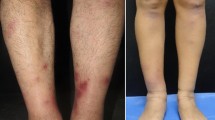Abstract
Anti-endomysium antibody (AEA) was evaluated in 136 subjects by indirect immunofluorescence using both cryosections of monkey oesophagus (MO) and the human umbilical cord vein (HUCV) as substrate. This human tissue gave results comparable to those of MO. In particular, the HUCV sections showed positive results in all 22 newly diagnosed cases of coeliac disease. Compared to the MO sections, the sensitivity, specificity and positive predictive values of HUCV tissue was 100%.
Conclusion HUCV tissue can replace MO for AEA detection and can make the screening for coeliac disease easier both in at-risk and in normal populations, with a remarkable saving, both in terms of money and of monkeys.
Similar content being viewed by others
Author information
Authors and Affiliations
Additional information
Received: 15 October 1996 and in revised form: 18 February 1997 / Accepted: 4 March 1997
Rights and permissions
About this article
Cite this article
Not, T., Città, A., Lucchesi, A. et al. Anti-endomysium antibody on human umbilical cord vein tissue: an inexpensive and sensitive diagnostic tool for the screening of coeliac disease. Eur J Pediatr 156, 616–618 (1997). https://doi.org/10.1007/s004310050676
Issue Date:
DOI: https://doi.org/10.1007/s004310050676




